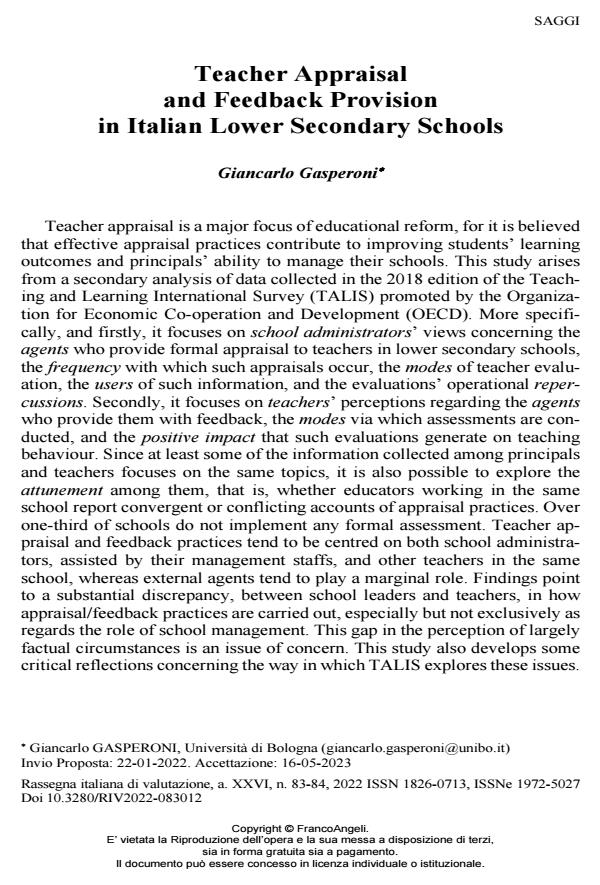Teacher Appraisal and Feedback Provision in Italian Lower Secondary Schools
Journal title RIV Rassegna Italiana di Valutazione
Author/s Giancarlo Gasperoni
Publishing Year 2023 Issue 2022/83-84
Language English Pages 23 P. 224-246 File size 257 KB
DOI 10.3280/RIV2022-083012
DOI is like a bar code for intellectual property: to have more infomation
click here
Below, you can see the article first page
If you want to buy this article in PDF format, you can do it, following the instructions to buy download credits

FrancoAngeli is member of Publishers International Linking Association, Inc (PILA), a not-for-profit association which run the CrossRef service enabling links to and from online scholarly content.
Teacher appraisal is a major focus of educational reform, for it is believed that effective appraisal practices contribute to improving stu-dents’ learning outcomes and principals’ ability to manage their schools. This study arises from a secondary analysis of data collected in the 2018 edition of the Teaching and Learning International Survey (TALIS) promoted by the Organization for Economic Co-operation and Development (OECD). More specifically, and firstly, it focuses on school administrators’ views concerning the agents who provide for-mal appraisal to teachers in lower secondary schools, the frequency with which such appraisals occur, the modes of teacher evaluation, the users of such information, and the evaluations’ operational repercussions. Secondly, it focuses on teachers’ perceptions regarding the agents who provide them with feedback, the modes via which assess-ments are conducted, and the positive impact that such evaluations generate on teaching behaviour. Since at least some of the information collected among principals and teachers focuses on the same topics, it is also possible to explore the attunement among them, that is, whether educators working in the same school report convergent or conflicting accounts of appraisal practices. Over one-third of schools do not im-plement any formal assessment. Teacher appraisal and feedback prac-tices tend to be centred on both school administrators, assisted by their management staffs, and other teachers in the same school, whereas ex-ternal agents tend to play a marginal role. Findings point to a substan-tial discrepancy, between school leaders and teachers, in how apprais-al/feedback practices are carried out, especially but not exclusively as regards the role of school management. This gap in the perception of largely factual circumstances is an issue of concern. This study also develops some critical reflections concerning the way in which TALIS explores these issues.
Keywords: teacher appraisal, teacher feedback, TALIS, principal-teacher attunement.
- Agasisti T., Falzetti P. and Soncin M. (2020). School Principals’ Managerial Behaviours and Students' Achievement: An Empirical Analysis of Italian Middle Schools. International Journal of Educational Management, 34, 5: 937-951. DOI: 10.1108/IJEM-11-2018-0350
- Ainley J., Carstens R. (2018). Teaching and Learning International Survey (TALIS) 2018 Conceptual Frame work. OECD Education Working Papers, 187.
- Argentin G. (2018). Gli insegnanti nella scuola italiana. Ricerche e prospettive di intervento. Bologna: Mulino.
- Argentin G., Barone C. (2016). La riforma della scuola: innovazione e retorica del cambiamento. In: Carbone M. and Piattoni S., eds., Politica in Italia. Edizione 2016. Bologna: Mulino.
- Asso P.F., Azzolina L., Pavolini P., eds. (2015). L’istruzione difficile. I divari nelle competenze fra Nord e Sud. Rome: Donzelli
- Azzolina L. Nerozzi S. (2015). I dirigenti scolastici. In: Asso et al. (eds.), L’istruzione difficile. Rome: Donzelli.
- Borg S. (2019). Contemporary Perspectives on Teacher Appraisal: A Working Paper. Sharjah: Regional Center for Educational Planning-UNESCO.
- Bottani N., Checchi D., eds. (2012). La sfida della valutazione. Bologna: Mulino.
- Capano G., Terenzi P. (2019). I gruppi di interesse e la legge sulla Buona Scuola. Rivista italiana di politiche pubbliche. 2: 247-276
- Dordit L. (2011). Modelli di reclutamento, formazione, sviluppo e valutazione degli insegnanti. Breve rassegna internazionale. Trento: IPRASE.
- Eurydice-Unità italiana (2009). Modelli di valutazione degli insegnanti in UE. Brussels: Eurydice.
- FGA-Fondazione Giovanni Agnelli (2011). Rapporto sulla scuola in Italia 2011. Rome-Bari: Laterza.
- FGA-Fondazione Giovanni Agnelli (2014). La valutazione della scuola. Rome-Bari: Laterza.
- Freddano M., Pastore S., eds. (2018). Per una valutazione delle scuole oltre l’adem pimento. Riflessioni e pratiche sui processi valutativi. Milan: Franco Angeli.
- Fusacchia A. (2022). Lo Stato a nudo. Storia intima della «Buona scuola». Rome-Bari: Laterza.
- Gasperoni G. (2010). La valutazione dell’insegnamento. In: Cavalli A. and Argentin G., eds., Gli insegnanti italiani. Come cambia il modo di fare scuola. Terza indagine del l’Isti tuto IARD sulle condizioni di vita e di lavoro nella scuola italiana. Bologna: Mulino.
- Gasperoni G., Mantovani D. (2013) Gli stili di dirigenza scolastica in Italia secondo l’indagine TALIS. Scuola Democratica-Learning for Democracy, IV, 3: 763-789 DOI: 10.12828/75718
- Hyman H.H. (1972). Secondary Analysis of Sample Surveys: Principles, Procedures, and Potentialities. New York: Wiley.
- Isoré, M. (2009). Teacher Evaluation: Current Practices in OECD Countries and a Literature Review. OECD Education Working Papers, 23. DOI: 10.1787/22328363142
- Nomisma (2009). La professione docente: valore e rappresentanza. Rome: AGRA.
- OECD (2009). Teacher Evaluation: A Conceptual Framework and Examples of Country Practices. Paris: OECD.
- OECD (2013a). Synergies for Better Learning: An International Perspective on Evaluation and Assessment. Paris: OECD.
- OECD (2013b). Teachers for the 21st Century: Using Evaluation to Improve Teaching. Paris: OECD.
- OECD (2019a). TALIS 2018 Technical Report. Paris: OECD.
- OECD (2019b). TALIS 2018 and TALIS Starting Strong 2018 User Guide. Paris: OECD.
- OECD (2019c). TALIS 2018 Results (Volume I): Teachers and School Leaders as Lifelong Learners. Paris: OECD.
- OECD (2020). TALIS 2018 Results (Volume II): Teachers and School Leaders as Valued Professionals. Paris: OECD.
- Paletta A., Basyte Ferrari E., Alimehmeti G. (2020). How Principals Use a New Accountability System to Promote Change in Teacher Practices: Evidence from Italy. Educational Administration Quarterly, 56, 1: 123-173. DOI: 10.1177/0013161X1984039
Giancarlo Gasperoni, Teacher Appraisal and Feedback Provision in Italian Lower Secondary Schools in "RIV Rassegna Italiana di Valutazione" 83-84/2022, pp 224-246, DOI: 10.3280/RIV2022-083012